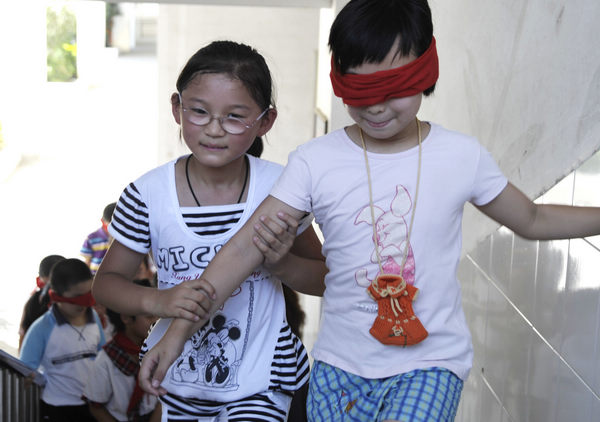Society
Counselors to help the helpers after disasters hit
By He Dan (China Daily)
Updated: 2011-05-13 07:51
 |
Large Medium Small |
|
 Chen Xinyu (left), from Guangyuan, Sichuan province, a survivor of the devastating earthquake that struck her home province on May 12, 2008, takes part in a psychological game in which she helps a "blind" partner at a primary school in Hefei, the capital of Anhui province, in this file photo. [Photo/China Daily] |
BEIJING - China should train more professionals to provide psychological counseling and treat mental trauma among not only the victims of major disasters but also their rescuers, said a senior official with the Red Cross Society of China on Thursday.
"During the past few years, we have realized the importance of offering psychological counseling to people affected by disasters, but what we are able to offer lags behind demand," said Li Lidong, deputy director of the society's relief and health department.
As a complement to material aid, psychological and social intervention lets people "mentally readjust to the changes", said Jeyathesan Kulasingam, an expert with the International Federation of Red Cross and Red Crescent Societies.
The Red Cross Society of China plans to compile a series of training manuals and run six pilot projects across the country by the end of this year, said Lin Dan, program director of the society's Sunshine in Your Heart Project.
She added that six emergency response teams will each recruit 30 voluntary consultants who will later be trained to work closely with the local Red Cross societies to address people's mental health needs whenever there are disasters.
Although there are more post-disaster psychological counselors working today than in the past, there are no official numbers that show how many there are in China, Lin said.
"Another important task is the setting up of a national database to record this group of talents and ensure that we can rapidly mobilize these resources in an emergency," Lin said.
Fu Yu, a psychologist from the Baotou Association of Psychological Consultants, welcomed the move to offer additional care to those who need it after disasters, especially rescue workers.
"Police officers, soldiers and volunteers usually rush to the frontline to help soon after a disaster happens, so sometimes they see the most horrible scenarios and these can weigh heavy in their hearts," Fu said.
He cited an air crash in 2004 in Baotou city, in North China's Inner Mongolia autonomous region, as an example.
All 53 people aboard a China Eastern aircraft died in the crash seconds after takeoff and one person died on the ground.
Fu said he went to the scene and noticed that soldiers were suffering from emotional pain as they retrieve corpses and body parts.
"As human beings, the helpers also need help themselves," Fu said.
| 分享按钮 |



